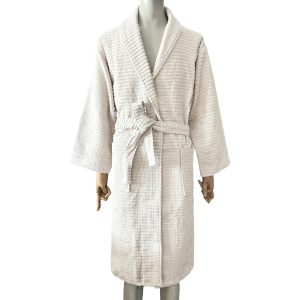Investing in innovation in towel production has led to the development of several advanced technologies that enhance performance, sustainability, and consumer satisfaction. Here are some of the notable new technologies and innovations in towel production:
1. Advanced Fiber Technologies
- Microfiber Blends: Microfiber towels, made from a blend of polyester and polyamide, offer superior absorbency, quick-drying capabilities, and softness. The technology behind microfiber ensures that the fibers are extremely fine and dense, making these towels highly effective for both drying and cleaning.
- Bamboo and Tencel Fibers: Bamboo towels and those made from Tencel (a fiber derived from eucalyptus wood) incorporate technologies that enhance their softness, moisture-wicking properties, and antibacterial qualities. These fibers are processed using environmentally friendly methods, contributing to sustainability.
2. Sustainable Dyeing and Finishing Processes
- Low-Water Dyeing Techniques: Innovations in dyeing technology, such as low-water and waterless dyeing processes, reduce the amount of water and chemicals used. Techniques like dyeing with supercritical CO2 or advanced pigment technologies minimize environmental impact while ensuring vibrant, long-lasting colors.
- Eco-Friendly Finishes: New finishes, such as those using natural enzymes or plant-based treatments, improve towel performance without harmful chemicals. These finishes can enhance properties like softness, durability, and resistance to fading or shrinkage.
3. Energy-Efficient Manufacturing
- Smart Factories: The adoption of smart factory technologies, such as IoT (Internet of Things) and AI (Artificial Intelligence), allows for real-time monitoring and optimization of production processes. These technologies can improve efficiency, reduce waste, and ensure consistent product quality.
- Water and Energy Recycling: Closed-loop systems that recycle water and energy during the manufacturing process help reduce resource consumption and environmental impact. These systems can significantly lower the ecological footprint of towel production.
4. Enhanced Performance Features
- Antimicrobial Treatments: Innovations in antimicrobial technology, such as silver-ion treatments or plant-based antimicrobial agents, prevent the growth of bacteria and fungi on towels. This keeps towels fresher for longer and reduces odor.
- Quick-Dry Technologies: Advanced weaving techniques and fiber treatments improve the quick-dry capabilities of towels. These innovations ensure that towels dry faster, reducing energy consumption during drying and improving convenience for users.
5. Recycling and Circular Economy
- Recycled Materials: The use of recycled fibers, such as recycled polyester from post-consumer plastics, is becoming more common. This approach reduces the need for virgin resources and helps address plastic waste issues.
- Circular Economy Models: Some companies are adopting circular economy practices by designing towels with end-of-life recycling in mind. This includes using recyclable materials, offering take-back programs, or creating towels that can be easily repurposed or recycled.
6. Biodegradable and Compostable Materials
- Biodegradable Fibers: Advances in biodegradable fiber technology allow for the production of towels that break down more quickly and safely in composting environments. Materials like bamboo and certain bioplastics are examples of biodegradable options.
- Compostable Packaging: Innovations in packaging include the use of compostable and biodegradable materials, reducing the environmental impact of towel packaging and supporting overall sustainability goals.
7. Enhanced Comfort and Design
- 3D Weaving: 3D weaving technology creates towels with improved texture and cushioning. This method can enhance the plushness and absorbency of towels while maintaining durability.
- Customizable Designs: Advances in digital printing and textile technology enable more detailed and customizable designs on towels. This allows for greater personalization and aesthetic options for consumers.
8. Smart Towels
- Embedded Sensors: Some innovative towels incorporate embedded sensors that can monitor and report various metrics, such as moisture levels or temperature. These smart features can enhance user experience and provide valuable data for improving towel performance.
By integrating these cutting-edge technologies, the towel industry is not only improving product quality and performance but also making strides toward greater sustainability and environmental responsibility. Investing in these innovations can lead to better, more efficient, and eco-friendly towel products for consumers.




















